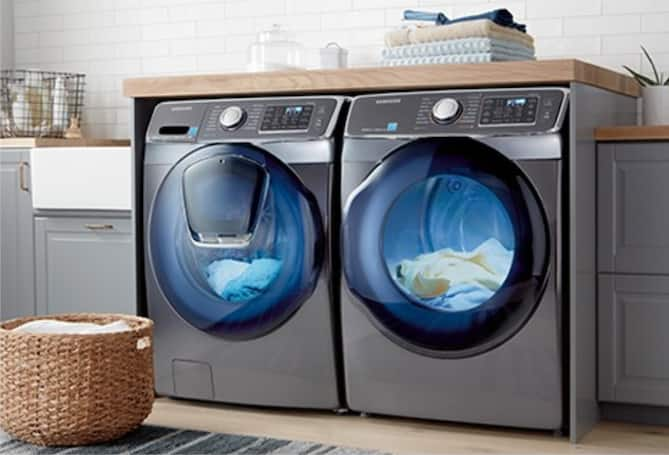Which is Better Electric or Gas Dryer?

Best Selling Products carousel(6 Items)
Benefits of gas dryers
To install a gas dryer, you must have a gas hook-up for the appliance. If you do, it might seem like a no-brainer to go with a gas appliance. But it’s not always that straightforward. For example, you might only have an electrical outlet in your laundry room but you’re considering going with a gas model instead for more efficient drying. Another possibility is that you’re at the point in your remodeling project where you have to decide which type of connection to install – a gas hookup or an electrical one.
To help with your decision, consider the benefits of a gas dryer. One advantage of drying a load of laundry in a gas dryer is that it typically takes less time than an electric model, which increases efficiency in your daily chores. Since gas dryers heat up more quickly, they are also more energy efficient. This means that the dryer will likely cost less to operate over the long term. Keep in mind that the cost savings will vary depending on the prices of gas and electric where you live.
While the positives are appealing, it’s wise to know the drawbacks as well. In terms of initial cost, gas dryers are usually more expensive than comparable electric models. Therefore, you may save on utility bills each month, but you might spend more on upfront costs. Because of the risk of a gas leak, maintenance and repairs on appliances that use gas can require professional expertise, which is an added expense to consider. Another thing to note is that a gas dryer still needs electricity to turn the drum, operate lights and select load settings, so you will still need to have a standard electrical outlet near the dryer in addition to the gas hookup.
Benefits of electric dyers
To operate an electric dryer, you need to plug the power cord into a 240-volt utility outlet. Because this is higher voltage than a standard outlet, you may need to have a new outlet installed by an electrician. This additional cost might be enough to base your decision on the type of dryer your laundry space can already accommodate. However, if you’re redesigning or building new, you can always have an electrician install a 240-volt outlet for your dryer up front, which leaves your options open should you change your mind in the future.
If you’re leaning towards electric, consider the overall benefits. Compared to gas models, electric dryers are usually less expensive in terms of up-front cost. Plus, the lack of a gas element can make an electric appliance easier to maintain and repair. Furthermore, if you use renewable energy, such as solar panels and storage banks, you can use it to operate your dryer. This factor is important for those who strive for sustainable living options in their home.
As far as the drawbacks go, there are just a few. Compared to a gas dryer, an electric dryer requires more time to dry a load of laundry. This is because electricity takes longer to reach high heat than the rate that gas power can. Related to this, operating costs will generally be higher because of the amount of electricity used to reach the optimal temperature for drying. Although, it could take years for this to make a substantial difference in your pocketbook, especially since you likely saved on the initial cost of the appliance.
What about combo washer/dryers and stacked units?
Since all combo washer/dryers are currently electric, this takes away the worry about which type of hookup you need. This is because they must be water-tight for the washing cycle, so they cannot feature an exhaust vent. They are, however, a very convenient option if you only have space for one appliance.
If you still want gas laundry appliances that use space wisely, there’s also the option for a stacked washer and dryer. These models are set up with the washer on the bottom and the dryer on top. Fortunately, these stackable versions are available in both gas and electric.
Which type of dryer will last longer?
Both gas and electric dryers have the same average lifespans (10-13 years), so, thankfully that should not factor into your decision-making process. What you should look for is the ENERGY STAR certified label on your new appliance to help you choose a model that is designed for energy efficiency, whether you choose gas or electric. This designation is achieved by meeting strict energy-efficient guidelines set by the U.S. Environmental Protection Agency and the U.S. Department of Energy.
Ultimately, there are benefits and trade-offs with each type of dryer. However, knowing their strengths and weaknesses can help you decide on the best type of dryer for your home. Whichever you choose – gas or electric – be sure to also grab the right dryer parts and accessories, such as power cables and vent hoses, to make set up and installation a breeze.